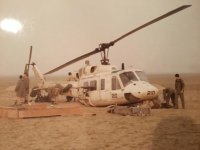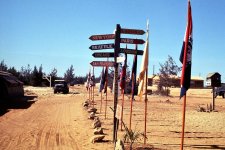FIRE!
When our little Advance Party began to lay out our Line at our desert site, we noted another small party doing the same thing nearby. We walked over and found a similar Advance Party from the 148th EVAC out of Arkansas had been given the same mission as us, to co-locate adjacent to our own hospital. They too worked in the mud and the rain, and we talked with them a little, but we were separated by some hundreds of yards, and were too busy to have much interaction with them, or they with us.
To higher command, I am sure it seemed like a good idea, putting our hospitals together inside our berm, so we could share resources, and work together as a big "med center" or something like that. Share staff, supplies, support one another's needs and capacities and capabilities. As our two hospitals began to rise out of the desert, I did attend some of their staff meetings, but soon we had little if any interaction. I guess we were too busy coordinating our present and future efforts, other than loaning them our big road compactor, as they had really rutted up their area. In the latter months of our mission, I never saw the need to visit their site, and had no need or interest in seeing now they lived and worked.
Besides, our hospital's moral was very high, and I think we felt we are better than the 128th anyway. There was nothing we wanted from them, and I am sure their personnel felt the same way about my own 410 EVAC. We were superior to them in every way. At least, we thought so. I suspect they too accomplished their mission in a proud and masterful way. They were closed down and returned Stateside later sooner than we were. We just didn't need anything from anyone else.
Troop moral is dependent on many factors, but prime among them is good chow and mail from home. After some time, our mess team working hard got our "kitchen" up and running, and as soon as possible we had a hot breakfast, and a hot dinner; it was always MRE's for lunch. We had great cooks, who worked day and night to do the best they could out in the desert.
One early day, we looked over towards the 148th's side of the compound, and saw black smoke billowing up. They were on fire!!
So some of us grabbed some fire extinguishers, and threw them into a truck and raced over to help. Of course, feeling like they were dummies for letting a fire start, we pulled up to their burning mess/kitchen tent making all sorts of fire engine sounds, hollering out sirens and bells and alarms. Sounds mean and ill-spirited , but such was the competition between our hospitals. Of course, in reflection, we were fortunate that we did not experience the great risk of a fire too. Just an accident.
So we hopped out and helped put out their fire, and offered condolences, and drove "home'. But now they had no kitchen for their staff and patients, so our cooks gave them all the equipment we could spare, so in a few says their mess section was again up and running. As far as I know, helping rebuild their kitchen was the only time the two hospitals supported one-another.
I am sure the Arkansas folks would have done everything possible for us, if necessary. But deep down, all of us knew we were the best medical unit in the War. I think our males also thought we had the best looking female troopers too.
Here, what a burned out kitchen looks like. We were lucky it wasn't ours.
All the best, and stay safe.... SF VET















